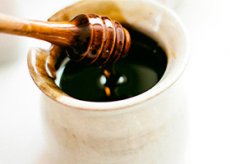New publications
What are the benefits of manuka honey?
Last reviewed: 02.07.2025

All iLive content is medically reviewed or fact checked to ensure as much factual accuracy as possible.
We have strict sourcing guidelines and only link to reputable media sites, academic research institutions and, whenever possible, medically peer reviewed studies. Note that the numbers in parentheses ([1], [2], etc.) are clickable links to these studies.
If you feel that any of our content is inaccurate, out-of-date, or otherwise questionable, please select it and press Ctrl + Enter.

Regular bee honey is an extremely healthy product. But what do you know about manuka honey? Scientists have discovered that this type of bee sweetness is especially healthy.
Even small amounts of manuka honey can block the development of pathogenic bacteria and stop the formation of microbial walls, according to scientists from the University of Southampton.
Manuka honey is brought from New Zealand - it is a product of local beekeeping, which insects prepare from the pollen of flowers growing on the manuka tree. The tree has a lush crown with a large number of pinkish and white flowers. Honey is used both for treatment and simply as food: it can be used internally and externally.
The medicinal and preventive properties of manuka were discovered by Europeans back in the 19th century: they noticed that the unique New Zealand honey was richer and thicker than the varieties known to us. This is due to the large amount of methylglyoxal in the product. This is a powerful antimicrobial substance that inhibits the growth of bacteria.
The latest study by scientists involved the use of Manuka honey during bladder catheterization. As it was noted, even very small amounts of this honey literally killed the vast majority of microbes, which reduced the risk of urinary tract infection during catheterization.
All doctors know that prolonged catheterization of the bladder can cause various infectious complications. The plastic surface of the catheter becomes covered with bacterial plaque, which is difficult to remove. Interestingly, even with strong dilution, manuka honey coped with its task perfectly: no side effects or negative consequences for patients were noted.
Specialists from Great Britain tested the effect of honey on the cultures of Escherichia coli and Proteus mirabilis. These microorganisms most often provoke the appearance of so-called "catheter" urinary tract infections. Honey was diluted with water to obtain a 3.3%, 6.6%, 10%, 13.3% and 16.7% solution.
As a result, the scientists discovered that the weakest honey solution reduced the adhesive capacity of microbes, disrupted the formation of bacterial plaque and significantly reduced the number of pathogenic microorganisms.
The experiment was conducted in an ideal laboratory setting, and the scientists expressed confidence that manuka honey could find worthy application in practical medicine.
"Catheter complications are very common, so this problem has long required a high-quality solution. We believe that manuka honey will significantly reduce the percentage of infectious diseases of the urinary tract. Perhaps in the future this product will delight us with other useful properties," the authors of the scientific project note.
The information is published on the website of the Journal of Clinical Pathology.
